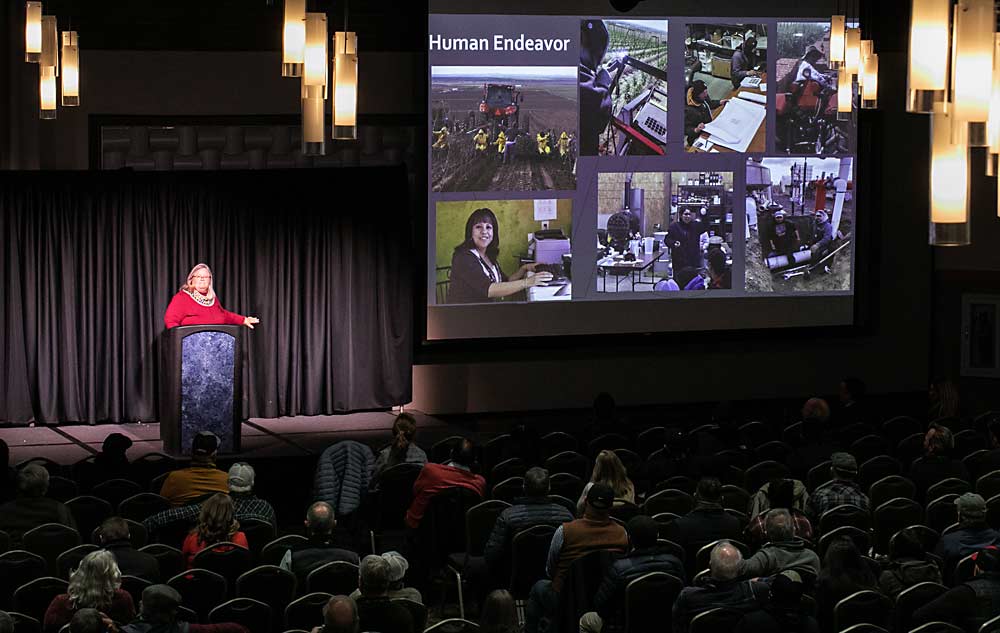
Monday morning highlights
A few speakers during the Monday morning session of the Washington State Tree Fruit Association Annual Meeting joked about receiving “sitting” ovations.
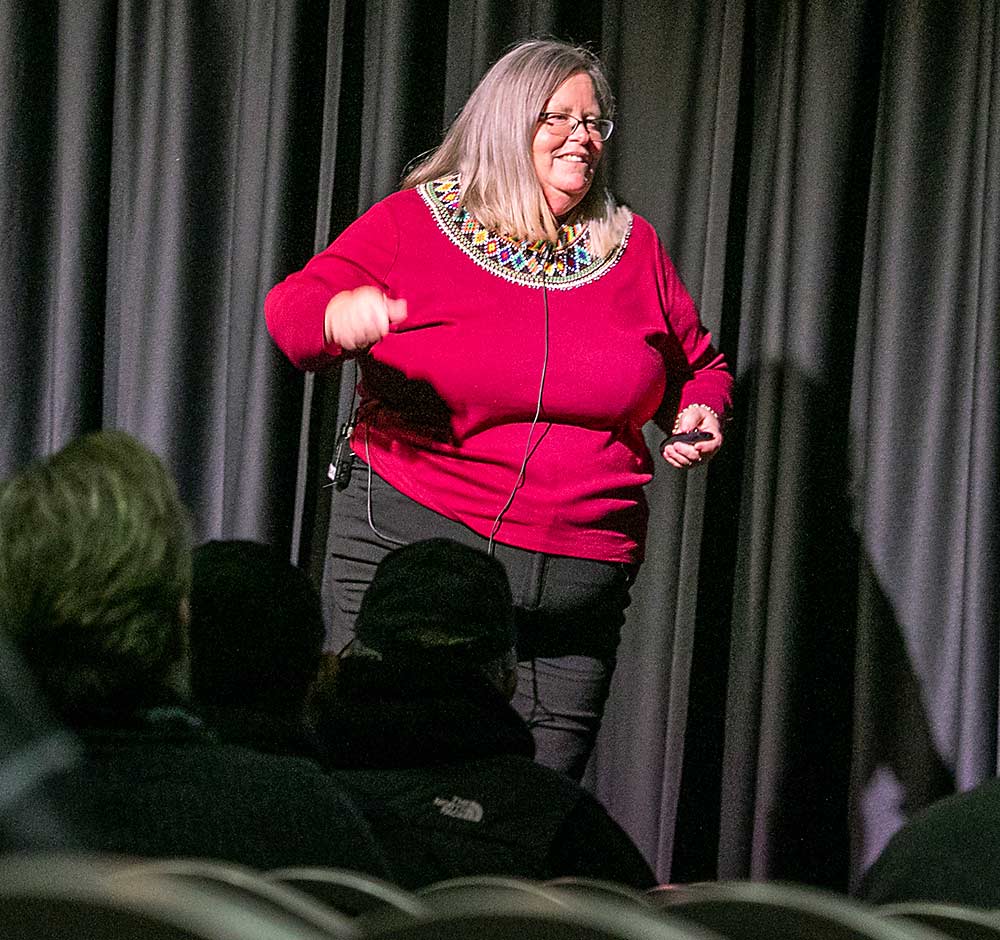
Karen Lewis received a standing one.
Lewis, a longtime horticulture extension specialist for Washington State University, delivered the 42nd annual Batjer Address, the academic highlight of the annual tree fruit conference, held Dec. 5–7 in the Wenatchee, Washington, convention center. She walked the conference audience through 35 years of experience with the fruit industry facing uncertainty, innovating through platforms and other technology, forming partnerships worldwide, developing workforces through community colleges and state agencies, and rising to meet challenges.
“I think you’re in great hands,” Lewis said. “I think that the future is very bright.”
Lewis has adopted a more administrative role, serving since 2020 as the director of the WSU extension service’s Agriculture and Natural Resources Program Unit, and she doesn’t interact as often with tree fruit growers, she said. She received the first standing ovation of the day.
“Thanks for letting me be part of the story,” she said.
Other highlight speakers included Steve Largent, a longtime NFL star receiver for the Seattle Seahawks who later served in the U.S. House of Representatives, from 1994–2002, as a Republican in his home state of Oklahoma. Largent, the keynote speaker, discussed four ingredients of leadership — character, preparation, courage and teamwork — and answered a lot of questions about his football career, including his role in resolving two players’ strikes during his career.
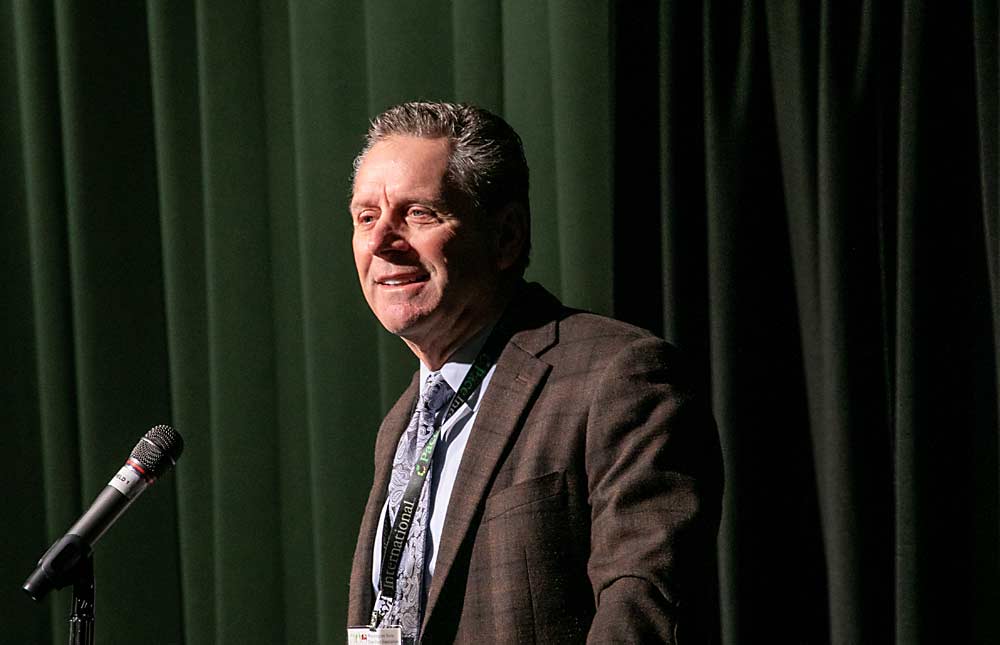
An agricultural economist was another highlight of the morning session. Damian Mason, who grew up on a dairy and row crop farm in Indiana, called on farmers in America to abandon the notion of “feeding the world.”
With increased education for girls throughout the globe, population will decline while food production increases in efficiency.
The challenge is to find ways to automate for an aging population, convince the public that human well-being requires stable energy and agriculture, and quit relying on China as a trading partner.
“I think we’ve got to address this one fact: China does not want to be our customer; they want to be our replacement,” he said.
The former comedian also poked some fun at farmers, especially row-croppers like himself, coining his own extra verse to Paul Harvey’s famous “So God Made a Farmer” speech: “God looked down on this planned paradise and said, … ‘I needed a person who will sit in a tractor that steers itself and then talk about how nobody else works hard.’ So, God made a farmer.”
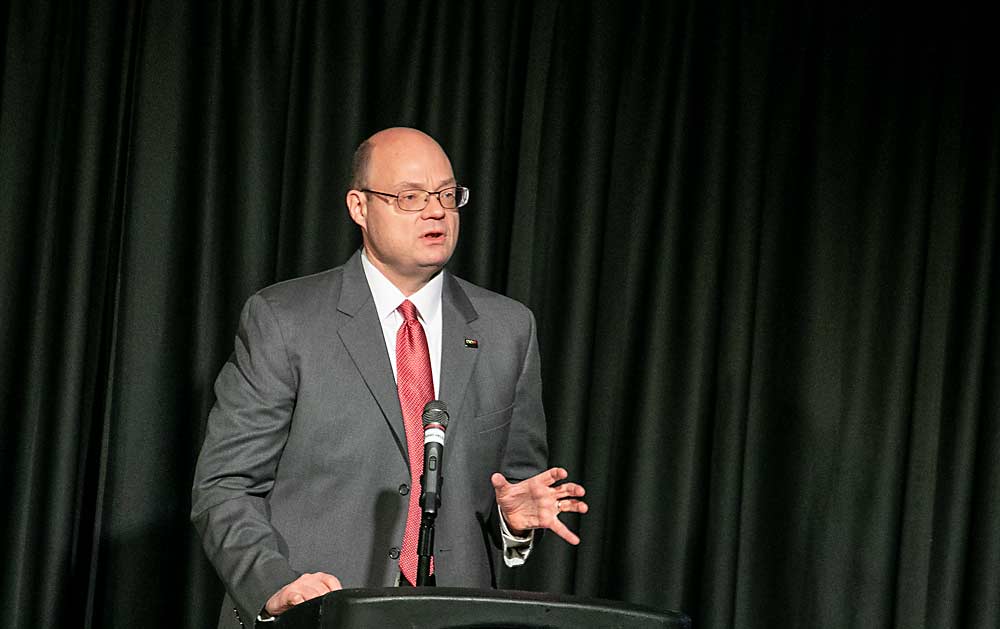
And Jon DeVaney, president of the Washington State Tree Fruit Association, discussed regulatory challenges that his group is facing on behalf of the industry, including seeking seasonal flexibility for Washington’s overtime mandate for farmworkers and fighting higher taxes on reusable packaging. He touted one win: WSTFA and other farm advocates convinced state lawmakers to permanently reinstate a tax exemption for common paymasters, which allows farms with multiple corporate entities to pay their workers with a single check.
—by Ross Courtney
Monday afternoon highlights
The afternoon session focused on weather and climate, ranging from long-term global trends to developing 10-day forecasts for your farm’s own weather station.
Talks started broad, with University of Washington meteorologist Cliff Mass discussing how weather forecasting technology has improved with increases in computing power.
On the subject of climate change, he said it’s clear human-produced greenhouse gases are acting “as a blanket” in the Earth’s atmosphere, driving a warming trend. But in the Pacific Northwest, Mass said the impacts are moderate: temperatures have risen 1 to 2 degrees Fahrenheit; precipitation remains consistent, but snowpack will shrink, which has consequences for irrigation systems.
“Global warming is a problem, it’s not an existential threat,” he said.
Next, WSU’s Kirti Rajagopalan discussed how those global climate models can be applied to specific aspects of orchard management, such as codling moth control, sun stress management or how to overwinter honey bees.
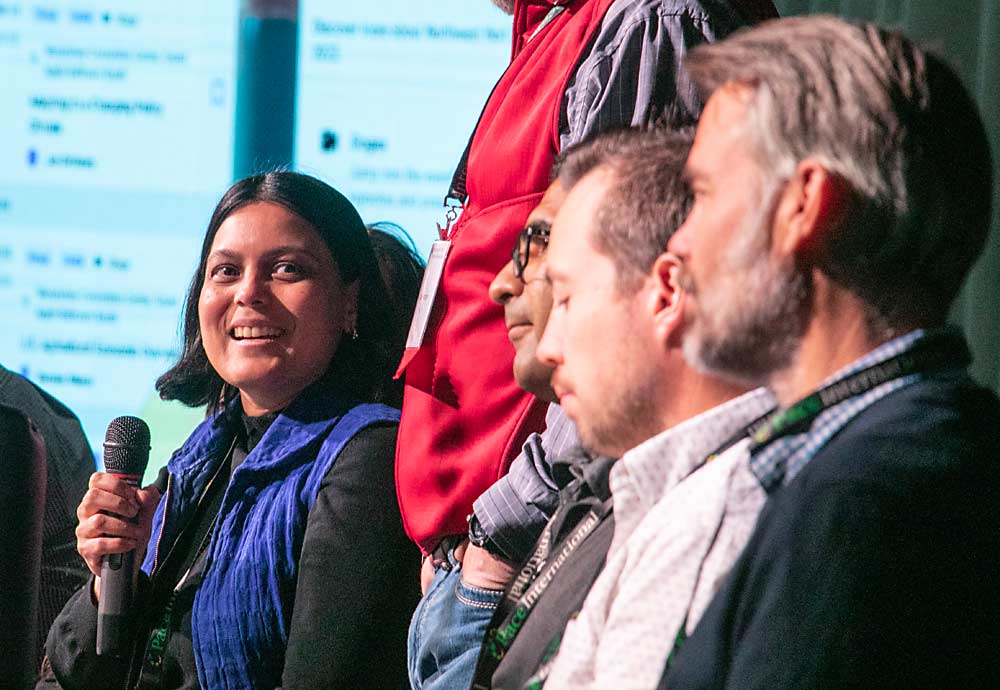
Rajagopalan, an assistant professor of biological systems engineering, models how future climates will impact these temperature-dependent processes. For example, a warming climate will accelerate codling moth development, narrowing the windows for pesticide applications that target certain life stages, she said.
Or, consider honey bees, which need to rest in the winter to save strength to restart the hive’s activity in the spring. But warm enough winter days will prompt them to fly and tire out, with no food to be found. Right now, those days are rare. But in Richland, over the coming decades, the warmer winter weather could lead to significant colony declines, she said.
“Indoor regulated cold storage works pretty well in managing this, and it’s likely to play an increasing role moving forward,” Rajagopalan said.
Lav Khot, the director of WSU’s AgWeatherNet, also shared an update on how the weather station network is growing and the efforts underway to develop localized forecasts and better frost risk predictions.
The session ended with a panel of WSU scientists taking audience questions about climate and weather research and orchard impacts.
Postharvest physiologist Carolina Torres answered a question about why some fruit seemed more susceptible to bruising this season. The answer lies in maturity. This year, poor color development led to a lot of Honeycrisp harvested at higher maturity, she said.
“Honeycrisp had high levels of ethylene at harvest, so it’s going to keep that rate,” Torres said of the apples going into storage. “For those overripe apples, bruising is going to be high … and susceptibility is going to increase over time.”
—by Kate Prengaman






Leave A Comment